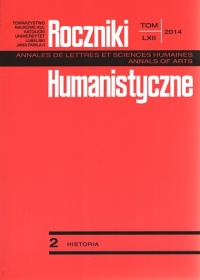Walka polityczna i personalna w lubelskich organach PZPR w okresie październikowym na tle walk frakcyjnych w KC PZPR w 1956 r.
Abstrakt
Powstanie frakcji w KC PZPR po XX Zjeździe KPZR miało zasadniczy wpływ na sytuację w niższych ośrodkach partyjnych. Brak silnego przywództwa spowodował powrót Władysława Gomułki, który w 1956 r. cieszył się niezachwianym poparciem społecznym. W Lublinie popularność Gomułki wykorzystali studenci UMCS należący do partii. Organizując wiece poparcia dla wyboru Gomułki na stanowisko I sekretarza, chcieli zaskarbić sobie przychylność społeczeństwa województwa, by zrealizować własne cele polityczne. Grupa była przeciwna nowo wybranemu I sekretarzowi KW Władysławowi Kozdrze, którego do Lublina przysłał KC. Grupę tą nazywamy rewizjonistami.
Oprócz grupy studentów w KW PZPR w Lublinie zawiązały się dwie grupy. Pierwsza z nich, będąca ówczesnym kierownictwem komitetu, miała na celu zachowanie zajmowanych stanowisk. W związku z ich postawą nazwani zostali koniunkturalistami. Powrót Gomułki nie był przychylnie przez nich przyjęty. Druga z grup, związana w lubelskim oddziałem ZBoWiD-u, miała na celu przejęcie władzy w KW. Prawdopodobnie osoby te cieszyły się poparciem Mieczysława Moczara. Ich cel został zrealizowany w listopadzie 1956 r., lecz po miesiącu grupa utraciła stanowisko I sekretarza KW na rzecz popieranego przez KC Władysława Kozdry. Kozdra w grudniu 1956 r. zlikwidował w KW ośrodki opozycyjne wobec siebie, pozostając do 1971 r. I sekretarzem KW PZPR w Lublinie. Główni przedstawiciele grupy koniunkturalistów i grupy związanej z ZBoWiD-em, zostali przeniesieni na inne stanowiska, nieoznaczające partyjnej degradacji. Grupa rewizjonistów została rozwiązana i utraciła wszelkie znaczenie polityczne.
Bibliografia
Codogni P.: Rok 1956, Warszawa: Prószyński i S-ka 2006.
Czubiński A.: Przełom roku 1956. Geneza i znaczenie, w: Przełomowy rok 1956. Poznański Czerwiec, Polski Październik, Budapeszt, red. E. Makowski, S. Jankowiak, Poznań: Wydawnictwo Poznańskie 1998.
Dąbrowski M.: NSZZ „Solidarność” Region Środkowo-Wschodni, w: NSZZ „Solidarność” 1980-1989, t. V, red. Ł. Kamiński, G. Waligóra, Warszawa: Instytut Pamięci Narodowej. Komisja Ścigania Zbrodni przeciwko Narodowi Polskiemu 2010.
Eisler J.: Marzec 1968, w: PRL od lipca 44 do grudnia 70, red. K. Persak, P. Machcewicz, Warszawa: Bellona 2010.
Eisler J.: Polskie miesiące czyli kryzys(y) w PRL, Warszawa: Instytut Pamięci Narodwoej 2008.
Eisler J.: Zarys dziejów politycznych Polski 1944-1989, Warszawa: Polska Oficyna Wydawnicza „BGW” 1992.
Gomułka W.: O naszej partii, Warszawa: Książka i Wiedza 1968.
Machcewicz P.: Polski Rok 1956, Warszawa: Mówią Wieki 1993.
Machcewicz P.: Władysław Gomułka, Warszawa: Wydawnictwa Szkole i Pedagogiczne 1995.
Radziński E.: Stalin, tłum. I. Lewandowska i M. Jagiełło, Warszawa: Magnum 1996, s.594-609.
PPR, PPS, PZPR. Struktura aparatu centralnego 1944-1980. Kierownicy i zastępcy kierowników wydziałów: 1944-1980, oprac. W. Ciempiel, J. Jakubowski, J. Szczeblewski, Warszawa: Centralne Archiwum KC PZPR 1980.
Szumiło M.: Bazyli Hołod (1907-1963) – kariera ukraińskiego komunisty z ziemi włodawskiej, w: Życiorysy w trzy kultury wpisane. Włodawskie biografie, red. M. Bem, A. Duszczyk, Radom−Włodawa: Radomskie Towarzystwo Naukowe − Muzeum Pojezierza Łęczyńsko-Włodawskiego 2008.
Władyka W.: Kwasy i zasady w KC PZPR w 1956 r., w: Rok 1956 w Polsce i jego rezonans w Europie, red. J. Szymoniczek, E. C. Król, Warszawa: Instytut Studiów Politycznych PAN: Collegium Civitas 2009.
Władysław Kozdra, w: Słownik biograficzny działaczy polskiego ruchu robotniczego, t. III, red. F. Tych, Warszawa: Książka i Wiedza 1992.
Copyright (c) 2014 Roczniki Humanistyczne

Utwór dostępny jest na licencji Creative Commons Uznanie autorstwa – Użycie niekomercyjne – Bez utworów zależnych 4.0 Międzynarodowe.





